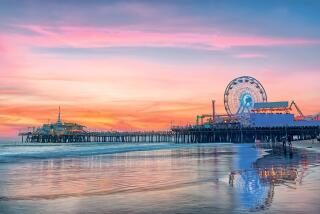Vegas: more red neon, less red alert
- Share via
The Last Honest Place in America
Paradise and Perdition in the New Las Vegas
Marc Cooper
Nation Books: 248 pp., $24.95
*
The conceit of “The Last Honest Place in America” is that Sept. 11 made America -- and Americans -- more serious, less ironic or playful. To test his premise, author Marc Cooper, a correspondent for the Nation magazine, went not to the bitter blowing sands of Iraq but to the well-watered desert of Las Vegas.
It remains, Cooper found, what it has always been: a place for gambling, sex and political corruption. Vegas, he seems to be saying, is to be taken at face value.
All that splendid neon, the fantastic replication of wondrous places far away, puts one in mind of what John Randolph of Virginia said of Edward Livingston: “He is a man of splendid abilities, but utterly corrupt. He shines and stinks like rotten mackerel by moonlight.”
Vegas fans don’t care. The shine attracts and amuses while you’re there; the stink doesn’t follow you back across the sere mountains of California, Nevada’s giant neighbor to the west, which retains after nearly 100 years of Progressive government an odor of Puritan sanctity. The state’s raffish neighbor to the east is where you go for fun and squalor.
The trouble with “The Last Honest Place in America” is that Cooper finds little to say about Las Vegas that hasn’t been said. The closest he comes is the discovery of the emptiness in all that talk a while back about Vegas as a “family destination” -- meaning that people could have their adult fun without guilt. The new corporate barons who took control of the vast gambling palaces were striking at the very basis of their satisfying fortunes when they thought that one up. Cooper finds that the pretense of offering a civic culture has been junked.
No loss for Cooper, who is into blackjack. His affection for the game forms the book’s underlying pulse, its particular beat. Who needs more of Bugsy Siegel or Moe Dalitz, Steve Wynn or Frank Sinatra, all dutifully introduced by Cooper, when there is serious business to attend?
“Blackjack validates you as a human being. You feel great when you win because you made enough good decisions to justify your playing the game,” Cooper writes, quoting Max Rubin, whom he calls the Apostle of Blackjack: “Blackjack is not only the most beatable game in Vegas, but it’s the one that requires the most skill, that depends most on the moves you make, the decisions you make. Play blackjack and you’re much more in control.”
Cooper concludes: “There’s no better game, unless you own the casino.”
He doesn’t like the “out and out sucker games” -- Wheel of Fortune, roulette, slots. Video poker, he says, is “the crack cocaine of modern gambling.”
He especially deplores the computerization of blackjack. One casino uses them to calculate how each hand has been played by each player as a means of “revealing and disarming evolving player strategies.”
“The shuffle machines and stacked ‘fun’ mutations are rapidly taking over the floor,” Cooper laments, “while relatively pure games of single deck are still found in just a few downtown casinos.”
The Las Vegas he shows us has lots of losers, and “honorable” is not the first word that would come to your mind to describe them. He takes us through the dubious fantasies of lap-dancing and the persistent quarrels over how much of it, and just what kind, should be allowed. He delves into gambling addiction, which the industry denies is a problem but spends a lot to combat.
Cooper introduces us to Frank Fahrenkopf, the former chairman of the Republican National Committee and now president and chief executive of the American Gaming Assn., an important evangelist for gambling. Cooper, as befits a Nation writer, considers Fahrenkopf too right-wing. He muses that Fahrenkopf’s politics might just be enough to lead a fellow to quit gambling altogether.
But given the feverish world of excitement and desire Cooper shows us in “The Last Honest Place in America,” that seems somehow unlikely.
More to Read
Sign up for our Book Club newsletter
Get the latest news, events and more from the Los Angeles Times Book Club, and help us get L.A. reading and talking.
You may occasionally receive promotional content from the Los Angeles Times.









